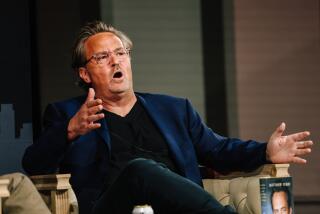Jill Soloway and Eileen Myles talk creativity, ‘queer’ art and the end of their relationship
- Share via
Jill Soloway and Eileen Myles are no longer together, they revealed from the stage at the Billy Wilder Theatre at the Hammer Museum on Wednesday night. “We still love each other,” Soloway said, “but we’re processing something now.” Myles interjected, “Right now.”
Soloway, the creator of the Amazon series “Transparent” and poet Myles had been in a high-profile relationship, showing up together on Hollywood red carpets and in New York gossip columns. “We’re not actually dating anymore,” Soloway said, minutes after taking the stage.
The crowd, which had gathered to hear the pair discuss ways of representing queerness in literature and the mass media, issued a few gasps of dismay.
What proceeded was a 90-minute forum that examined and challenged binaries between not only genders but, by its sheer intimacy, the private versus the public space. “We thought we would just process our relationship on stage,” Soloway said, inviting the audience to pipe up with questions at any point that they felt “triggered.” There were a few laughs and smiles from both speakers, but Soloway added, “This is totally serious, by the way.” It seemed a fitting venue for a couple that initially met on a museum panel in San Francisco more than a year ago as well as a fittingly subversive public collaboration for two writers known for breaking the mold.
“[Just] as we could see our relationship … coming out,” Soloway said, “it was also coming to an end.” In an age where digital media has increasing collapsed the distance between the public and celebrities, Soloway and Myles effectively used the Hammer event to reclaim ownership of what Soloway brilliantly dubbed the “public relations ship” of their romance, which was unveiled in a 2015 New Yorker profile of Soloway.
In an ingenious reversal, they took the stage as a means to bring us behind closed doors. Attendees could experience their own complicity and collusion in mythologizing a famous couple, while Soloway and Myles got the ultimate closure of telling the story of themselves. In other words, we got into it.
Representing “queer literature” and “queer television,” respectively, Myles and Soloway talked less about specific works (although Myles’ memoir “Afterglow” is forthcoming in April, and Soloway has recently released the Amazon pilot for “I Love Dick,” based on Chris Kraus’ novel) than they did the topics that inspire and inform them.
Soloway, who like Myles uses the gender-neutral pronoun “they,” discussed their recent transition to a “butch presentation.” Soloway felt relieved of “a whole aspect of performance.… If I’m not wearing female clothes I feel much more intellectually expressive.” (This was understandably a trigger for some audience members, a potential implication being that a “femme presentation” is intellectually hindering. Soloway addressed follow-up questions graciously.) Myles said that they “felt trans before [they] ever felt lesbian,” and that regarding their choice of pronoun “I thought a collective gender might be a place where I could be really comfortable, and it turns out to be true.”
Myles and Soloway have appeared in each other’s work, and Myles noted that their mutual influence has been its own “kind of exposure.” A character based loosely on Myles appears in “Transparent” Season 2, and Soloway has made their way into Myles’ poetry. (“I really, really wanted to get in some poems,” Soloway admitted.)
“The act of collaboration is kind of my favorite love act in the world,” said Myles. “There’s sweetness and difficulty in what we’re doing, which is talking about loving somebody and talking about it changing them.”
Shortly after the Paris attacks in 2015, Myles and Soloway collaborated on a document titled “The Thanksgiving Paris Manifesto,” and their live reading of that charter was perhaps the highlight of the night.
The manifesto calls for, among other things, “an immediate end to male government,” “an indictment of racism,” “mass-graves for pistols” and that “porn made by men is hereby outlawed for one hundred years.” Art made by men will also be banned for 50 years (an “adequate” time period as deemed by the manifesto) for “authentic female representation to take hold.” The ban would “offer men a sense of awe,” said Myles. The joint reading drew murmurs of approval, chuckles and applause. “This is so well written!” Myles said, clearly relishing both revisiting the creation of the manifesto and its reception.
In the moment, their proposed revolution seemed almost possible. “We both wanted to live in this imaginary world,” said Soloway of the time they spent writing the manifesto in a Paris hotel room, where they could “pretend that we’re part of history.” (A Paris hotel room is a particularly romantic setting, but that sense of urgency and significance will be familiar to anyone who’s ever been in love.) Myles, however, was optimistic, quick to seize on the value of even having co-written the charter itself. “I just have to say, when you make something that you feel passionate about, you do change history, and the world is changing.”
The evening was an inclusive, funny, and often touching live meditation on queerness, performativity, and the creative exchange between revolutionary artists who happened to have fallen in love.
Over the course of the event, their conversation touched on the male gaze, the patriarchy, “the degraded feminine,” poetry, television writing and more, but they kept circling back — partly in response to the audience’s curiosity — to the time they had spent together.
“It was beautiful,” said Soloway.
Myles agreed. “It still is.”
French is a writer in Los Angeles.
More to Read
Sign up for our Book Club newsletter
Get the latest news, events and more from the Los Angeles Times Book Club, and help us get L.A. reading and talking.
You may occasionally receive promotional content from the Los Angeles Times.








